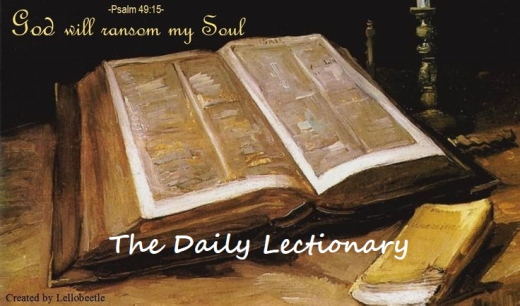 |
| Psalm 78:17-20, 52-55; 1 Kings 19:9-18; Romans 11:1-6 |
The Daily Lectionary
TUESDAY, February 25, 2020
(Revised Common Lectionary Year A)
Israel led to God’s holy mountain
17 But they continued to sin against him,
rebelling in the wilderness against the Most High.
18 They willfully put God to the test
by demanding the food they craved.
19 They spoke against God;
they said, “Can God really
spread a table in the wilderness?
20 True, he struck the rock,
and water gushed out,
streams flowed abundantly,
but can he also give us bread?
Can he supply meat for his people?”
…
52 But he brought his people out like a flock;
he led them like sheep through the wilderness.
53 He guided them safely, so they were unafraid;
but the sea engulfed their enemies.
54 And so he brought them to the border of his holy land,
to the hill country his right hand had taken.
55 He drove out nations before them
and allotted their lands to them as an inheritance;
he settled the tribes of Israel in their homes.
Elijah hears God
19:9 There he went into a cave and spent the night.
And the word of the Lord came to him: “What are you doing here, Elijah?”
10 He replied, “I have been very zealous for the Lord God Almighty. The Israelites have rejected your covenant, torn down your altars, and put your prophets to death with the sword. I am the only one left, and now they are trying to kill me too.”
11 The Lord said, “Go out and stand on the mountain in the presence of the Lord, for the Lord is about to pass by.”
Then a great and powerful wind tore the mountains apart and shattered the rocks before the Lord, but the Lord was not in the wind. After the wind there was an earthquake, but the Lord was not in the earthquake. 12 After the earthquake came a fire, but the Lord was not in the fire. And after the fire came a gentle whisper. 13 When Elijah heard it, he pulled his cloak over his face and went out and stood at the mouth of the cave.
Then a voice said to him, “What are you doing here, Elijah?”
14 He replied, “I have been very zealous for the Lord God Almighty. The Israelites have rejected your covenant, torn down your altars, and put your prophets to death with the sword. I am the only one left, and now they are trying to kill me too.”
15 The Lord said to him, “Go back the way you came, and go to the Desert of Damascus. When you get there, anoint Hazael king over Aram. 16 Also, anoint Jehu son of Nimshi king over Israel, and anoint Elisha son of Shaphat from Abel Meholah to succeed you as prophet. 17 Jehu will put to death any who escape the sword of Hazael, and Elisha will put to death any who escape the sword of Jehu. 18 Yet I reserve seven thousand in Israel—all whose knees have not bowed down to Baal and whose mouths have not kissed him.”
A remnant chosen by grace
11:1 I ask then: Did God reject his people? By no means! I am an Israelite myself, a descendant of Abraham, from the tribe of Benjamin. 2 God did not reject his people, whom he foreknew. Don’t you know what Scripture says in the passage about Elijah—how he appealed to God against Israel: 3 “Lord, they have killed your prophets and torn down your altars; I am the only one left, and they are trying to kill me”? 4 And what was God’s answer to him? “I have reserved for myself seven thousand who have not bowed the knee to Baal.” 5 So too, at the present time there is a remnant chosen by grace. 6 And if by grace, then it cannot be based on works; if it were, grace would no longer be grace.
Optional parts of the readings are set off in [square brackets.]
The Bible texts of the Old Testament, Epistle, and Gospel lessons are from The Holy Bible, New International Version®, NIV® Copyright ©1973, 1978, 1984, 2011 by Biblica, Inc.® Used by permission. All rights reserved worldwide.
The Daily Lectionary is a three-year cyclical lectionary. We are currently in Year A. Beginning with the first Sunday of Advent in 2020, we will be in Year B. The year which ended at Advent 2019 was Year C. These readings complement the Sunday and festival readings: Thursday through Saturday readings help prepare the reader for the Sunday ahead; Monday through Wednesday readings help the reader reflect and digest what they heard in worship. Revised Common Lectionary Daily Readings, copyright © 2005 Consultation on Common Texts. www.commontexts.org
The Daily Lectionary for TUESDAY, February 25, 2020
Psalm 78:17-20, 52-55; 1 Kings 19:9-18; Romans 11:1-6







